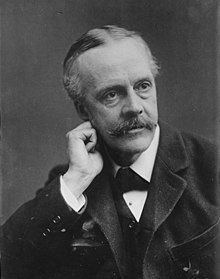

Prime Minister of the United Kingdom
Arthur James Balfour 25 July 1848 Whittingehame House, East Lothian, Scotland
19 March 1930(1930-03-19) (81) Woking, Surrey, England
12 July 1902 – 4 December 1905
Prime Minister of the United Kingdom from 1902 to 1905 This article is about the politician. For the steel manufacturer, see Arthur Balfour, 1st Baron Riverdale. "Lord Balfour" redirects here. For the titles in the peerages of Scotland, Ireland, and the United Kingdom, see Baron Balfour of Glenawley, Baron Balfour of Inchrye, Earl of Balfour, and Lord Balfour of Burleigh. Arthur James Balfour, 1st Earl of Balfour, KG, OM, PC, FRS, FBA, DL (/ˈ b æ l f ər , -f ɔːr / , traditionally Scottish /b əl ˈ f ʊər / ; 25 July 1848 – 19 March 1930) was a British Conservative statesman who served as Prime Minister of the United Kingdom from 1902 to 1905. As foreign secretary in the Lloyd George ministry, he issued the Balfour Declaration in 1917 on behalf of the cabinet. Entering Parliament in 1874, Balfour achieved prominence as Chief Secretary for Ireland, in which position he suppressed agrarian unrest whilst taking measures against absentee landlords. He opposed Irish Home Rule, saying there could be no half-way house between Ireland remaining within the United Kingdom or becoming independent. From 1891 he led the Conservative Party in the House of Commons, serving under his uncle, Lord Salisbury, whose government won large majorities in 1895 and 1900. An esteemed debater, he was bored by the mundane tasks of party management. In July 1902, he succeeded his uncle as prime minister. In domestic policy he passed the Land Purchase (Ireland) Act 1903, which bought out most of the Anglo-Irish land owners. The Education Act 1902 had a major long-term impact in modernising the school system in England and Wales and provided financial support for schools operated by the Church of England and by the Catholic Church. Nonconformists were outraged and mobilised their voters, but were unable to reverse it. In foreign and defence policy, he oversaw reform of British defence policy and supported Jackie Fisher's naval innovations. He secured the Entente Cordiale with France, an alliance that isolated Germany. He cautiously embraced imperial preference as championed by Joseph Chamberlain, but resignations from the Cabinet over the abandonment of free trade left his party divided. He also suffered from public anger at the later stages of the Boer war (counter-insurgency warfare characterised as "methods of barbarism") and the importation of Chinese labour to South Africa ("Chinese slavery"). He resigned as prime minister in December 1905 and the following month the Conservatives suffered a landslide defeat at the 1906 election, in which he lost his own seat. He soon re-entered Parliament and continued to serve as Leader of the Opposition throughout the crisis over Lloyd George's 1909 budget, the narrow loss of two further General Elections in 1910, and the passage of the Parliament Act 1911. He resigned as party leader in 1911. Balfour returned as First Lord of the Admiralty in Asquith's Coalition Government (1915–16). In December 1916, he became foreign secretary in David Lloyd George's coalition. He was frequently left out of the inner workings of foreign policy, although the Balfour Declaration on a Jewish homeland bore his name. He continued to serve in senior positions throughout the 1920s, and died on 19 March 1930 aged 81, having spent a vast inherited fortune. He never married. Balfour trained as a philosopher – he originated an argument against believing that human reason could determine truth – and was seen as having a detached attitude to life, epitomised by a remark attributed to him: "Nothing matters very much and few things matter at all".

We use cookies
We use cookies and other tracking technologies to improve your browsing experience on our website, to show you personalized content and targeted ads, to analyze our website traffic, and to understand where our visitors are coming from. Privacy Policy.